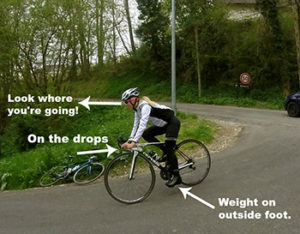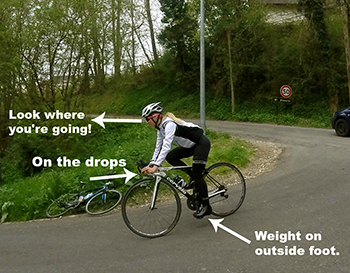Improve your skills and learn to how to descend safely on a road bike
 When I first started riding a road bike, nearly ten years ago, I thought you just jumped on and away you went, but it didn’t take me long to realise that there was more skills involved than I had first thought, and for me one of the hardest to master has been to descend safely on a road bike. And there’s definitely still room for improvement – part of lifelong learning program!
When I first started riding a road bike, nearly ten years ago, I thought you just jumped on and away you went, but it didn’t take me long to realise that there was more skills involved than I had first thought, and for me one of the hardest to master has been to descend safely on a road bike. And there’s definitely still room for improvement – part of lifelong learning program!
Here’s a few tips to hone your own skills:
Familiarise
The first step is to familiarise yourself with the condition of the road surface by riding up the hill. Look for loose gravel on the shoulders, potholes or cracks on the road surface. Look also at the radius of the turns – do they follow a continuous arc, or do they become sharper during the middle of the turn? Are there sections that suddenly become steeper? I find it much easier to descend on roads that I’ve ridden many times before, because you become familiar with them. Although I never become complacent, because a pothole could have opened up since last time I rode it.
Ride in the drops
With your hands on the lower part of the handlebar, your centre of gravity is closer to the ground which makes you more stable. Also, your weight will be more evenly distributed between the front and rear wheels, which helps maintain traction, especially during braking and turning. It also means that you can hold your brake levers more comfortably which makes a big difference on a long descent.
Scan ahead
Keep your head up rather than focusing on the road just in front of your bike. Look for danger signs so you have time to react. In turns, keep your eyes on the exit, which will help you carve a smooth, steady line all the way through. The old adage that you’ll end up where you look is so true when descending on a bike, so don’t look at the guardrail or the large tree as you round a corner, because that’s where you’ll end up heading. Potential hazards that you should keep a look out for include: painted white lines; wet drain covers; speed bumps; loose gravel; and fallen branches and leaves.
Stay relaxed
Start at the top of your body and let go of tension. Keep breathing, open your mouth to unclench your jaw, drop your shoulders, bend your elbows, release your death grip on the bar, uncurl your toes so your feet lie flat on the bottoms of your shoes. I’m particularly bad at this one and quite regularly remind myself to let go of the tension particularly in my shoulders and upper back.
Use subtlety to slow
Always anticipate what you’ll need to do next. This will help you avoid sudden braking. For controlled slowing, gently squeeze both levers equally with two to three second pulses. This is called feathering. Constantly riding the brakes on big descents can make rims overheat and possibly cause a blowout. This is particularly true with carbon rims which overheat more quickly. I choose to ride carbon wheels with an alloy braking surface because they don’t overheat as easily as a carbon braking surface.
Corner smart
The biggest mistake people make descending is to wait until they’re in the middle of a turn to brake. Instead, scrub speed before the turn. If you have to brake in the turn, you didn’t slow enough to begin with. Then, push your outside pedal down with pressure on that foot. To initiate the turn, lean the bike, not your body into the turn. The faster and sharper the turn, the more you’ll lean the bike. To exit the turn, gently straighten the bike.
Practice, practice, practice
Like all bike skills you need to practice it over and over again to learn it properly. Choose a small descent to begin, and repeat it over and over until you feel comfortable. Then tackle some bigger descents – you can practice your climbing skills on the way up!

